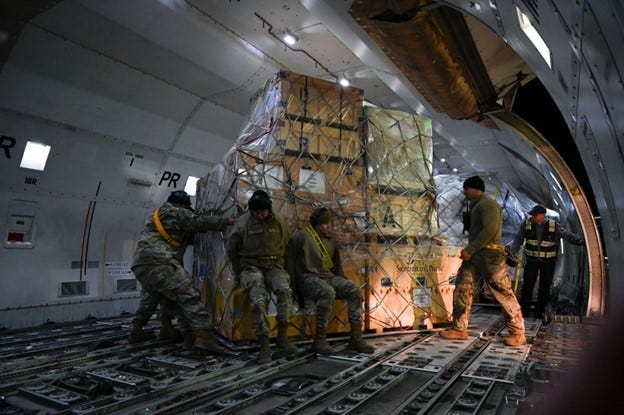
President Biden will announce in his State of the Union address tonight that he is directing the U.S. military to set up an emergency maritime port to deliver much higher volumes of humanitarian aid to Gaza, U.S. officials said today.
“Tonight, the President will announce in his State of the Union address that he has directed the U.S. military to undertake an emergency mission to establish a port in Gaza, working in partnership with like- minded countries and humanitarian partners,” a senior U.S. administration official, speaking not for attribution, told journalists on a call today.
“This port, the main feature of which is a temporary pier, will provide the capacity for hundreds of additional truckloads of assistance each day,” the senior administration official said. “Initial shipments will come via Cyprus, enabled by the U.S. military and a coalition of partners and allies.”
The maritime initiative is not expected to require any U.S. military boots to be on the ground in Gaza, officials said. It will take a number of weeks to plan and execute.
It comes as the United States is continuing to press Israel to open more land crossings into Gaza, permit more volume of aid to go through existing land routes, and as the United States has for the past week been conducting air drops of humanitarian aid into Gaza, which it will continue to do.
The President has directed “that we not wait for the Israelis”
“We have and will continue to pressure Israel to allow more aid into Gaza by land,” a second senior US administration official on the call said.
“But we have decided…and the President has directed, that we look at all options, and that we not wait for the Israelis,” the second official said. “We are pursuing every channel possible to get assistance to Gaza. So we will do it by air, by sea, by land--however, we can get the maximum amount in possible.”
“We’re not planning for this to be an operation that would require U.S. boots on the ground,” the second official said.
The maritime aid corridor to Gaza will involve Cyprus, and is an initiative that Israeli and Cypriot officials have been discussing for months, the officials said. Aid shipments will first go to a port in the Cypriot city of Larnaka, and be inspected by Israeli officials there, before the U.S. military ships it to Gaza.
The United Nations and other humanitarian partners will devise a mechanism for distributing the aid once it arrives in Gaza by sea, they said.
“We’re building a redundant system,” the U.S. official said. “So that…we aren't relying on one or two crossings as single points of failure in terms of being able to get assistance. So certainly it will be complex to work out, but I think the more avenues we have to get assistance in, the more we will be able to reliably move it around within Gaza as well.”
‘Difficult’ negotiations continue on six week pause, hostage release
Talks to try to reach a six week ceasefire deal and the release of elderly, sick and women hostages held by Hamas continue. U.S. officials said they had been briefed on the latest developments in the talks by the Egyptians this morning, but declined to predict if or when a deal might be reached.
“I'm not going to make a prediction,” the first senior U.S. administration official said. “It is a difficult negotiation, and any negotiation in its later stages can become extremely hard.”
“There's no there's no hard and fast deadline on this negotiation,” he said. “We are working to get it done as soon as possible.”
The United States should be pursuing a permanent end to the war between Israel and Hamas, rather than a more ambiguous six week pause that the administration suggests it would like to see further extended, said Shibley Telhami, a Middle East expert at the Brookings Institution and a professor at the University of Maryland.
“The American posture has to be that the aim is not to have resumption of the war after the ceasefire,” Telhami told me.
“Unless there is this sense that this is going to be war ending…and if it's seen as a transitional hostage deal with some additional humanitarian deliveries, I think it's doomed,” he said. “And even if there's an agreement, that agreement will have little chance of being implemented effectively.”
**


